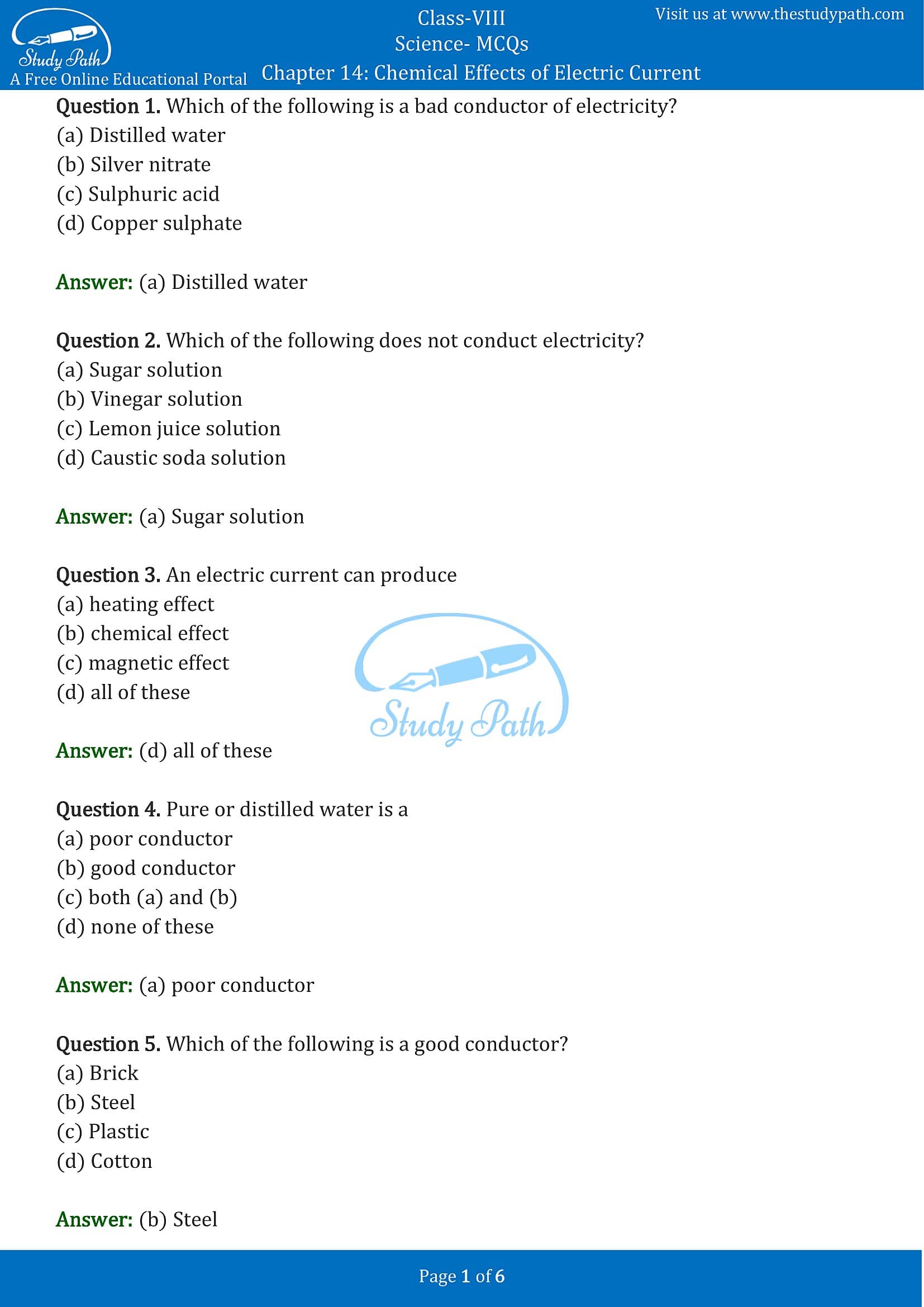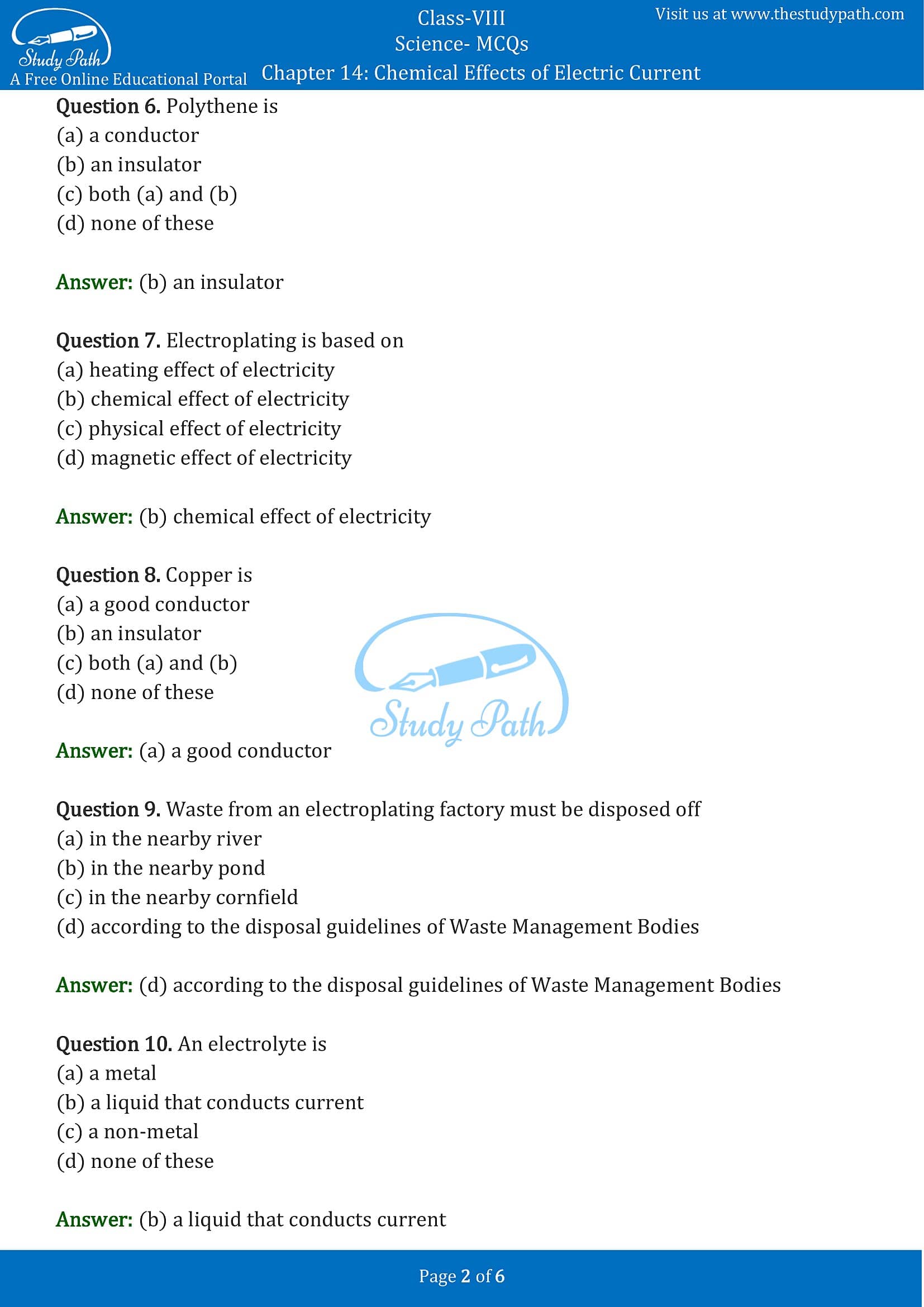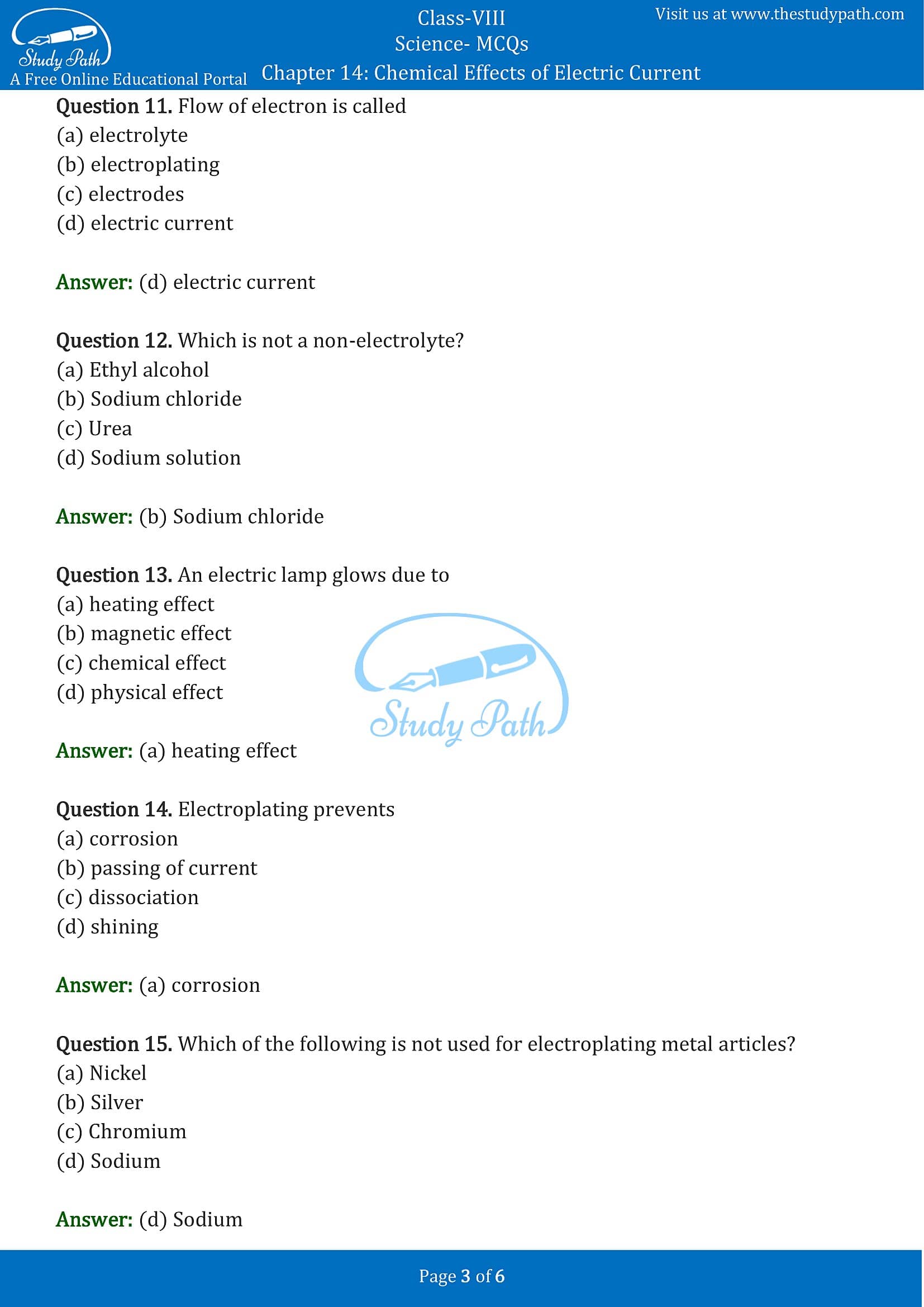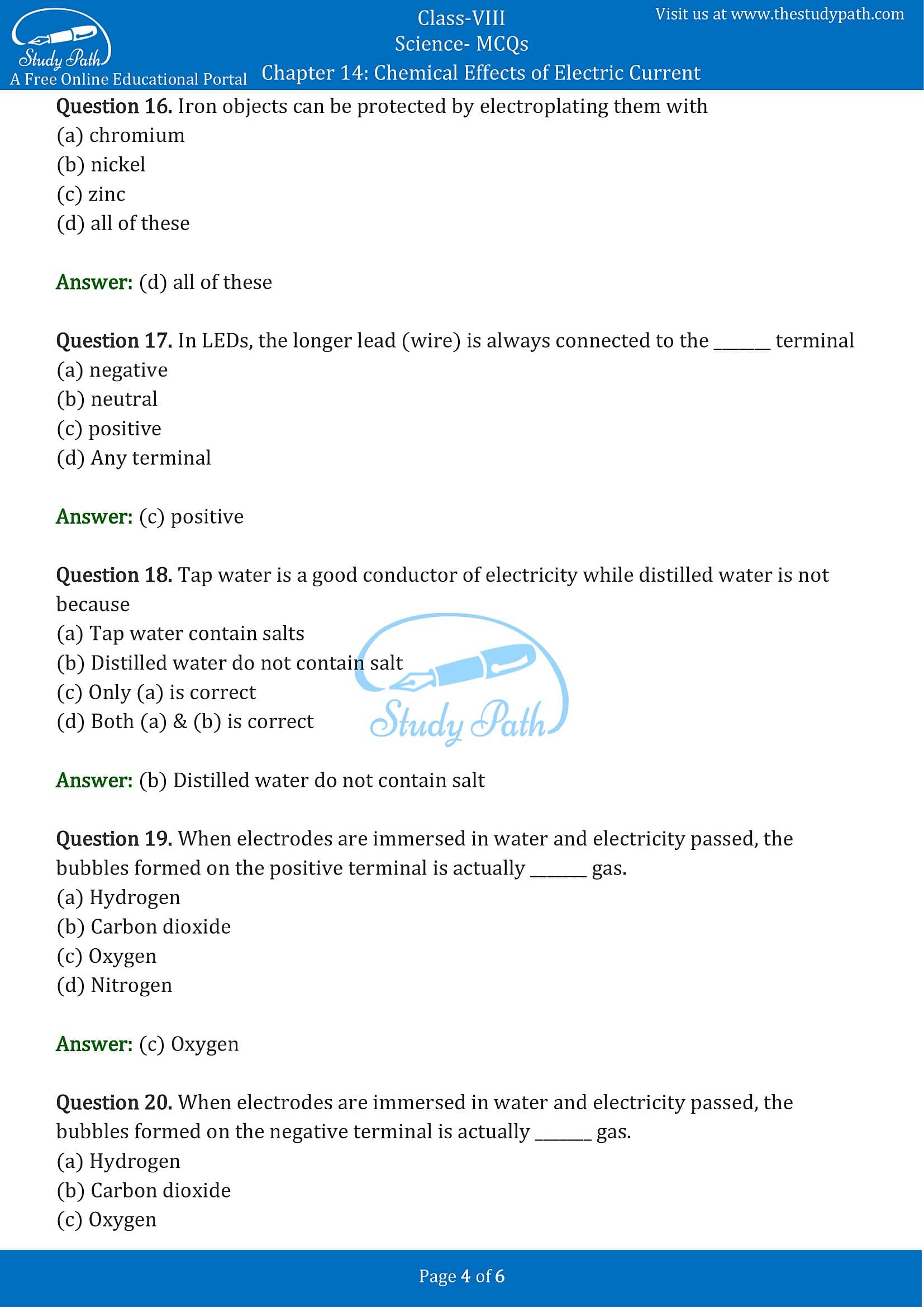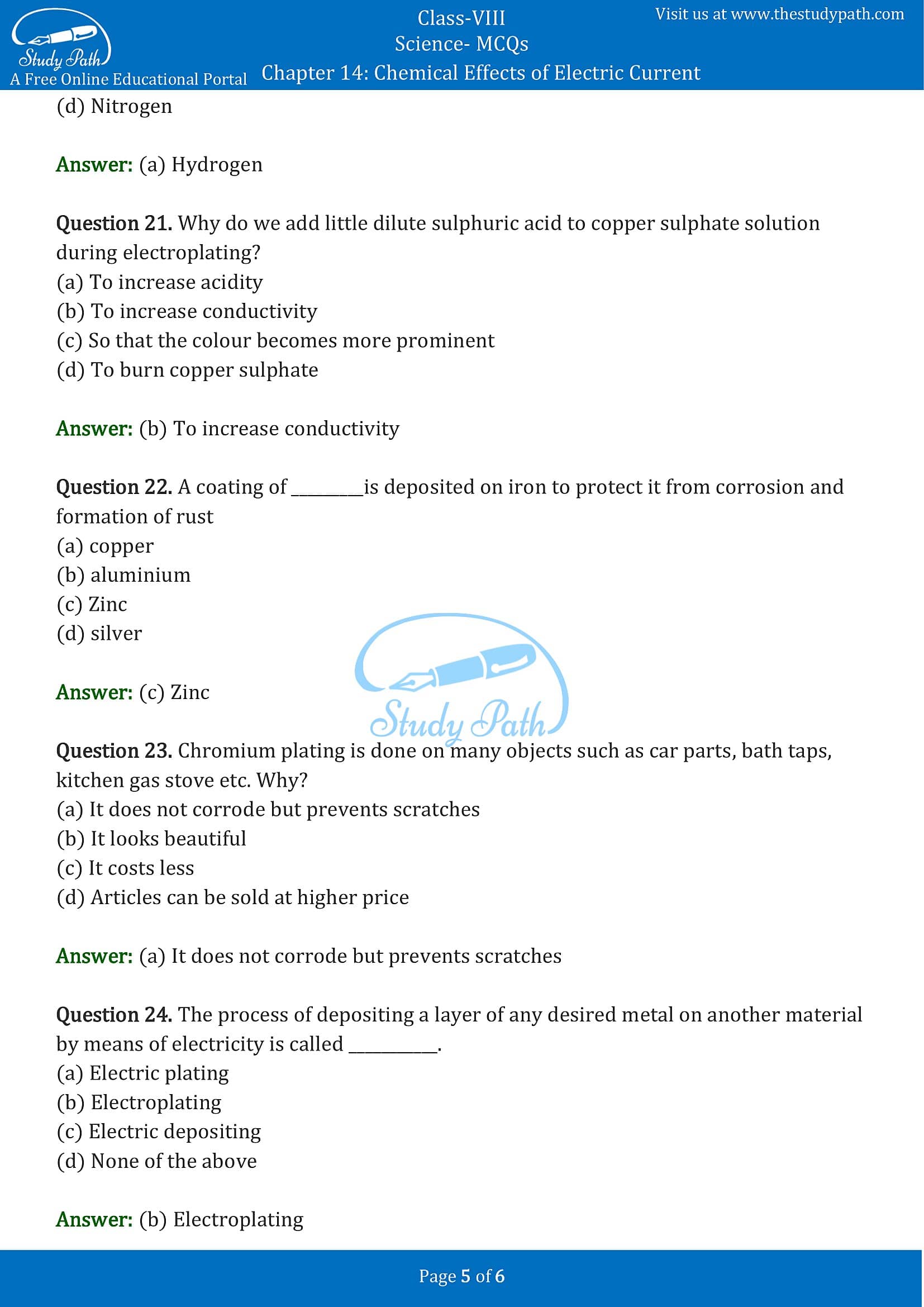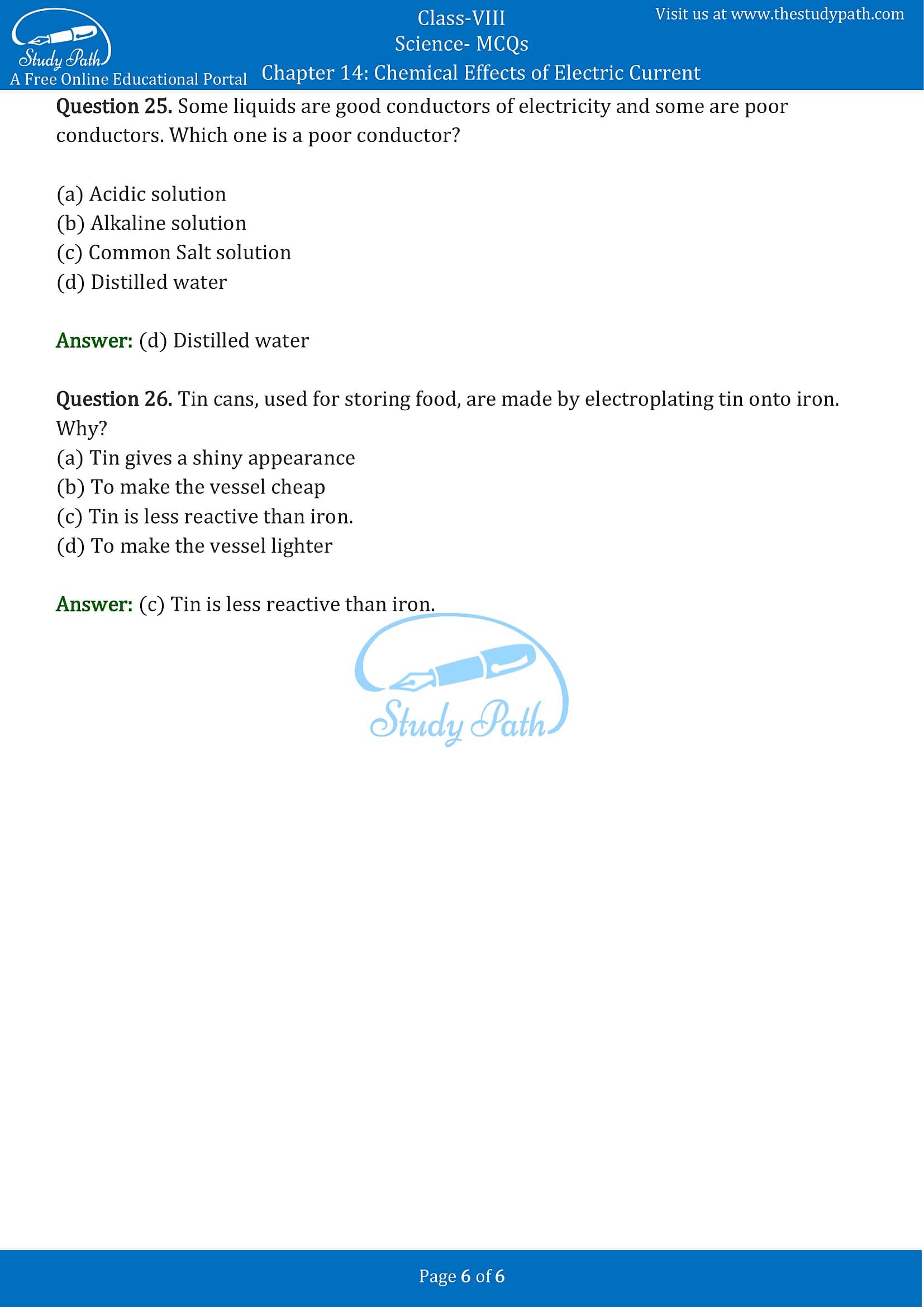Class 8 Science Chapter 14 Chemical Effects of Electric Current MCQ (Multiple Choice Questions) with Answers is available here in PDF format. CBSE Class 8 Science Chemical Effects of Electric Current Objective Questions helps the students to understand the concepts thoroughly and to score good marks. Practising these MCQs will help you to answer every question that is being asked in the exams.
At Study Path, you can download PDF of Multiple Choice Questions for Class 8 Chapter 14 Chemical Effects of Electric Current with Answers. We prepared these MCQs on the basis latest exam Pattern. Students can solve NCERT Class 8 Science Chemical Effects of Electric Current MCQs before the exam to know their preparation level.
Chemical Effects of Electric Current Class 8 MCQ with Answers
Multiple Choice Questions (MCQs)
Question 1. Which of the following is a bad conductor of electricity?
(a) Distilled water
(b) Silver nitrate
(c) Sulphuric acid
(d) Copper sulphate
Answer: (a) Distilled water
Question 2. Which of the following does not conduct electricity?
(a) Sugar solution
(b) Vinegar solution
(c) Lemon juice solution
(d) Caustic soda solution
Answer: (a) Sugar solution
Question 3. An electric current can produce
(a) heating effect
(b) chemical effect
(c) magnetic effect
(d) all of these
Answer: (d) all of these
Question 4. Pure or distilled water is a
(a) poor conductor
(b) good conductor
(c) both (a) and (b)
(d) none of these
Answer: (a) poor conductor
Question 5. Which of the following is a good conductor?
(a) Brick
(b) Steel
(c) Plastic
(d) Cotton
Answer: (b) Steel
Question 6. Polythene is
(a) a conductor
(b) an insulator
(c) both (a) and (b)
(d) none of these
Answer: (b) an insulator
Question 7. Electroplating is based on
(a) heating effect of electricity
(b) chemical effect of electricity
(c) physical effect of electricity
(d) magnetic effect of electricity
Answer: (b) chemical effect of electricity
Question 8. Copper is
(a) a good conductor
(b) an insulator
(c) both (a) and (b)
(d) none of these
Answer: (a) a good conductor
Question 9. Waste from an electroplating factory must be disposed off
(a) in the nearby river
(b) in the nearby pond
(c) in the nearby cornfield
(d) according to the disposal guidelines of Waste Management Bodies
Answer: (d) according to the disposal guidelines of Waste Management Bodies
Question 10. An electrolyte is
(a) a metal
(b) a liquid that conducts current
(c) a non-metal
(d) none of these
Answer: (b) a liquid that conducts current
Question 11. Flow of electron is called
(a) electrolyte
(b) electroplating
(c) electrodes
(d) electric current
Answer: (d) electric current
Question 12. Which is not a non-electrolyte?
(a) Ethyl alcohol
(b) Sodium chloride
(c) Urea
(d) Sodium solution
Answer: (b) Sodium chloride
Question 13. An electric lamp glows due to
(a) heating effect
(b) magnetic effect
(c) chemical effect
(d) physical effect
Answer: (a) heating effect
Question 14. Electroplating prevents
(a) corrosion
(b) passing of current
(c) dissociation
(d) shining
Answer: (a) corrosion
Question 15. Which of the following is not used for electroplating metal articles?
(a) Nickel
(b) Silver
(c) Chromium
(d) Sodium
Answer: (d) Sodium
Question 16. Iron objects can be protected by electroplating them with
(a) chromium
(b) nickel
(c) zinc
(d) all of these
Answer: (d) all of these
Question 17. In LEDs, the longer lead (wire) is always connected to the _______ terminal
(a) negative
(b) neutral
(c) positive
(d) Any terminal
Answer: (c) positive
Question 18. Tap water is a good conductor of electricity while distilled water is not because
(a) Tap water contain salts
(b) Distilled water do not contain salt
(c) Only (a) is correct
(d) Both (a) & (b) is correct
Answer: (b) Distilled water do not contain salt
Question 19. When electrodes are immersed in water and electricity passed, the bubbles formed on the positive terminal is actually _______ gas.
(a) Hydrogen
(b) Carbon dioxide
(c) Oxygen
(d) Nitrogen
Answer: (c) Oxygen
Question 20. When electrodes are immersed in water and electricity passed, the bubbles formed on the negative terminal is actually _______ gas.
(a) Hydrogen
(b) Carbon dioxide
(c) Oxygen
(d) Nitrogen
Answer: (a) Hydrogen
Question 21. Why do we add little dilute sulphuric acid to copper sulphate solution during electroplating?
(a) To increase acidity
(b) To increase conductivity
(c) So that the colour becomes more prominent
(d) To burn copper sulphate
Answer: (b) To increase conductivity
Question 22. A coating of _________is deposited on iron to protect it from corrosion and formation of rust
(a) copper
(b) aluminium
(c) Zinc
(d) silver
Answer: (c) Zinc
Question 23. Chromium plating is done on many objects such as car parts, bath taps, kitchen gas stove etc. Why?
(a) It does not corrode but prevents scratches
(b) It looks beautiful
(c) It costs less
(d) Articles can be sold at higher price
Answer: (a) It does not corrode but prevents scratches
Question 24. The process of depositing a layer of any desired metal on another material by means of electricity is called ___________.
(a) Electric plating
(b) Electroplating
(c) Electric depositing
(d) None of the above
Answer: (b) Electroplating
Question 25. Some liquids are good conductors of electricity and some are poor conductors. Which one is a poor conductor?
(a) Acidic solution
(b) Alkaline solution
(c) Common Salt solution
(d) Distilled water
Answer: (d) Distilled water
Question 26. Tin cans, used for storing food, are made by electroplating tin onto iron. Why?
(a) Tin gives a shiny appearance
(b) To make the vessel cheap
(c) Tin is less reactive than iron.
(d) To make the vessel lighter
Answer: (c) Tin is less reactive than iron.
At Study Path, you can also learn more about science chapter 14 Chemical Effects of Electric Current by accessing the free exhaustive list of study materials and resources related to the chapter such as NCERT Solutions, Important Questions and Extra Questions.
